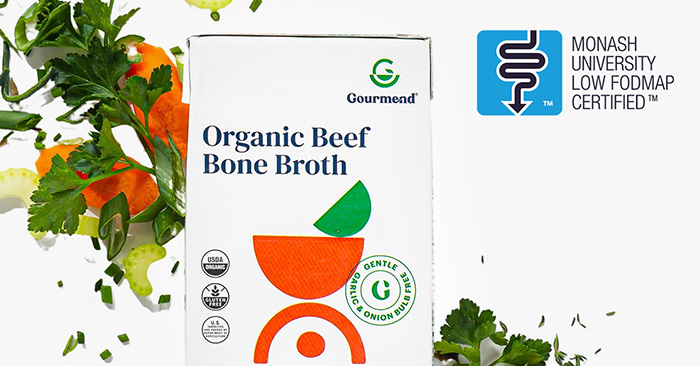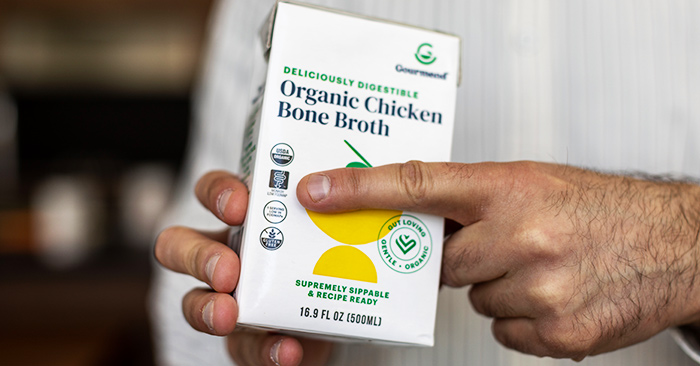Broth Beef: USDA, FDA Trying To Ban FODMAP Terms, Says Gourmend

When Ketan Vakil launched his low-FODMAP brand Gourmend Foods in 2020, he didn’t think he would eventually be suing the U.S. Department of Agriculture (USDA) and the Food and Drug Administration (FDA) over alleged violations of his first amendment rights.
But he is. On March 28 Vakil – along with one of his customers Michelle Przybocki – filed a complaint for declaratory and injunctive relief from the USDA and FDA over the use of low-FODMAP labeling on Gourmend packages (FODMAP is an acronym for “fermentable oligosaccharides, disaccharides, monosaccharides and polyols” or short-chain carbohydrates). The request for injunction was filed and is being fought by the nonprofit, public interest law firm Institute for Justice (IJ) in the U.S. District Court of Las Vegas, Nevada.
The lawsuit argues that “the USDA, FSIS, and the FDA ban the use of the words ‘low-FODMAP’ and related factual statements on food labels simply because they are not on the Agencies’ outdated list of pre-approved nutrient content information that can be used on food labels.”
“This is the first First Amendment challenge over whether the government can ban low-FODMAP terms,” said Justin Pearson, the IJ senior attorney arguing the case. “The principle we’re really trying to vindicate with this lawsuit, is the idea that the government does not get to decide which facts consumers are allowed to learn.”
The FDA told NOSH that it “does not comment on possible, pending or ongoing litigation.”
According to the International Foundation for Gastrointestinal Disorders, between 25 and 45 million people in the U.S. suffer from Irritable Bowel Syndrome (IBS), or about 10-15% of the American population. Some studies indicate that up to 80% of the people afflicted with IBS also suffer from Small Intestinal Bacterial Overgrowth (SIBO), an imbalance of gut microorganisms making it difficult to digest certain sugars. People who suffer from IBS and/or SIBO are often instructed to follow a low-FODMAP diet to cut out foods like dairy, wheat, legumes, onions, garlic and some fruits that can inflame their digestive maladies.
Vakil, who suffers from digestive issues, soft launched his brand with one product, a garlic scape powder, before expanding the portfolio to include shelf-stable chicken bone broth, six seasoning powders and a beef bone broth.
In the process of launching the Beef Bone Broth product though, Vakil ran into a new problem. While the brand’s Chicken Bone Broth fell under FDA regulatory approval, the USDA regulates beef and pork products and requires pre-approval for packaging claims. When Vakil submitted his Beef Bone Broth packaging for approval, the USDA told him that any low-FODMAP claims, including the Monash University Low FODMAP Certification logo, as well as all material explaining what a product ascribing to this diet means would need to be removed.
“Our customers obviously are looking for low-FODMAP products. If you suffer from severe problems, you really do need to understand and know for sure that our product is that,” Vakil said. “We went through the process to get third party certification and now no one really knows it.”
Co-plaintiff Michelle Przybocki was afflicted with debilitating and at-times life-threatening pain after she ate certain foods and was instructed to follow a FODMAP diet to ease her maladies. The case argues that people like Przybocki are put at a disadvantage because many “prepared and packaged foods almost never” provide information regarding FODMAP claims.
According to the lawsuit, the FDA and USDA do not debate the validity that Gourmend’s food products are verifiably low-FODMAP. Yet, because both federal agencies do not recognize low-FODMAP claims in the current nutrient content list, the brand is unable to market its products as such. Even though the FDA has not yet instructed the brand to remove the claims, Vakil said USDA representatives told Gourmend they had consulted with the agency in making its determination.

Another low-FODMAP brand, Fody Foods continues to sport low-FODMAP claims on its packaging. Vakil attributes this to an oversight by the FDA, as Fody’s snacks, seasonings, sauces and condiments did not require USDA approval.
“Which could mean all of us FODMAP brands could get warning letters from the FDA saying to remove that stuff from your packaging,” Vakil said. “Obviously, our stance is that we want the FDA and USDA involved and we don’t want stuff to be false…but this is a very factual claim that helps people and not knowing it hurts people.”
Fody Foods and Gourmend are not the only brands in the space and Vakil – along with the IJ – feel that this case will get ahead of a crackdown on FODMAP brands that are trying to educate and inform through packaging labels to people with digestive issues. Not being able to label products as low-FODMAP foods devalues the brands and one of the main purposes that company’s like Gourmend were established.
The IJ took on the case because the reverberations could have an impact on how brands like Gourmend are allowed to inform consumers, Pearson said, adding that in essence it boils down to “free speech.”
He has argued First Amendment challenges on food labels for years including a 11th Circuit Appellate Court case in Florida regarding skim milk labeling. He also argued against Mississippi’s ban of the term “veggie burgers” on labels which the state eventually backed down from.
“We should want businesses to provide as much information as possible to consumers using the plain language terms that you know consumers understand best,” Pearson said. “We have consumers who are told by their doctors to go find low-FODMAP foods to eat. And we have entrepreneurs like Ketan [Vakil], who want to give this information to consumers. But the federal government is getting in the way and that’s just not the way things are supposed to work.”
“The last thing the government should be doing is banning this undisputedly truthful speech,” Pearson added.


















